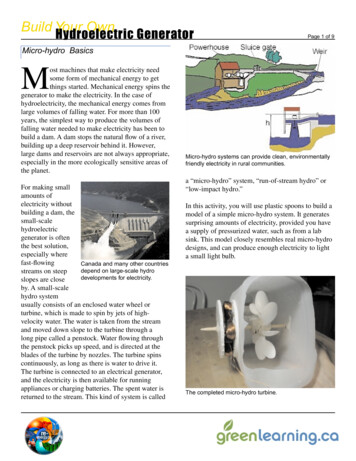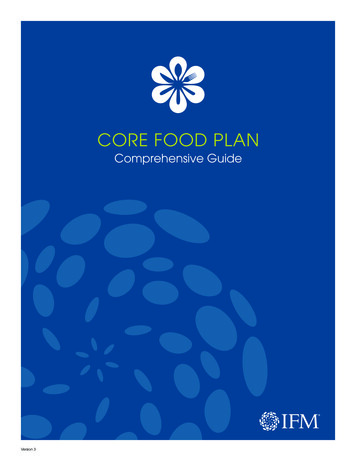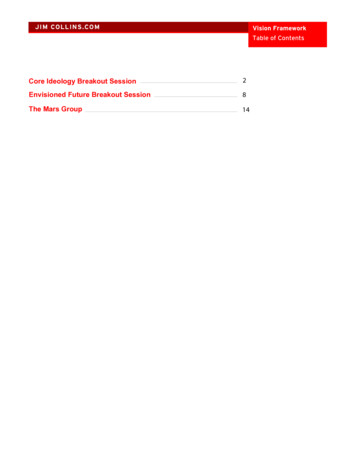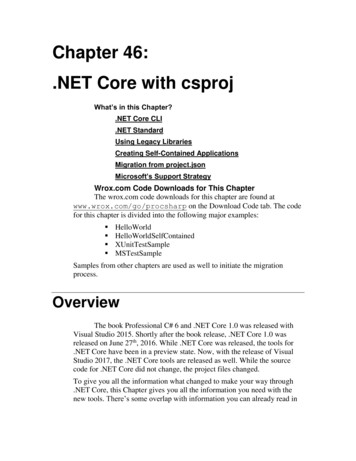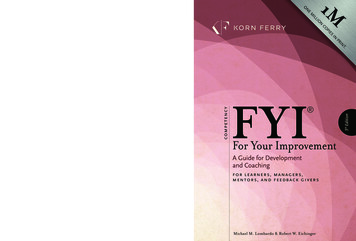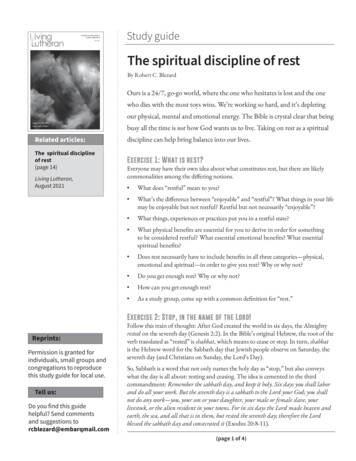
Transcription
Study guideThe spiritual discipline of restBy Robert C. BlezardOurs is a 24/7, go-go world, where the one who hesitates is lost and the onewho dies with the most toys wins. We’re working so hard, and it’s depletingour physical, mental and emotional energy. The Bible is crystal clear that beingbusy all the time is not how God wants us to live. Taking on rest as a spiritualThensings mysoulRelatedarticles:The spiritual disciplineof rest(page 14)Living Lutheran,August 2021Reprints:Permission is granted forindividuals, small groups andcongregations to reproducethis study guide for local use.Tell us:Do you find this guidehelpful? Send commentsand suggestions torcblezard@embarqmail.comdiscipline can help bring balance into our lives.Exercise 1: What is rest?Everyone may have their own idea about what constitutes rest, but there are likelycommonalities among the differing notions. What does “restful” mean to you? What’s the difference between “enjoyable” and “restful”? What things in your lifemay be enjoyable but not restful? Restful but not necessarily “enjoyable”? What things, experiences or practices put you in a restful state? What physical benefits are essential for you to derive in order for somethingto be considered restful? What essential emotional benefits? What essentialspiritual benefits? Does rest necessarily have to include benefits in all three categories—physical,emotional and spiritual—in order to give you rest? Why or why not? Do you get enough rest? Why or why not? How can you get enough rest? As a study group, come up with a common definition for “rest.”Exercise 2: Stop, in the name of the Lord!Follow this train of thought: After God created the world in six days, the Almightyrested on the seventh day (Genesis 2:2). In the Bible’s original Hebrew, the root of theverb translated as “rested” is shabbat, which means to cease or stop. In turn, shabbatis the Hebrew word for the Sabbath day that Jewish people observe on Saturday, theseventh day (and Christians on Sunday, the Lord’s Day).So, Sabbath is a word that not only names the holy day as “stop,” but also conveyswhat the day is all about: resting and ceasing. The idea is cemented in the thirdcommandment: Remember the sabbath day, and keep it holy. Six days you shall laborand do all your work. But the seventh day is a sabbath to the Lord your God; you shallnot do any work—you, your son or your daughter, your male or female slave, yourlivestock, or the alien resident in your towns. For in six days the Lord made heaven andearth, the sea, and all that is in them, but rested the seventh day; therefore the Lordblessed the sabbath day and consecrated it (Exodus 20:8-11).(page 1 of 4)
Study guide: The discipline of restcontinuedDiscuss: What is your understanding of the sabbath day? How did you cometo that understanding? How do you keep the sabbath day holy? How did you come to that way ofkeeping it? What does it imply that “sabbath” literally means “stop” or “cease”? What does the actual commandment from Exodus 20 tell us about how Godwants us to keep the sabbath day holy? To whom is the third commandment addressed? To the individual? The family?The community? The world? All of the above? Everyone is commanded to cease from work, not only the people but also theanimals. What does that say about God’s intention for the sabbath day? Why would God enshrine as a commandment for us—and the whole world—tostop work one day out of every seven? How would a complete “day off” once aweek benefit us? Benefit you? How would modern American Christians have to change in order to keep thesabbath as it is prescribed in the third commandment? Why have AmericanChristians strayed so much from the sabbath? How would you have to change in order to keep the sabbath as it is prescribed inthe third commandment? If American Christians began taking sabbath seriously and stopped—reallystopped—working on the sabbath, how would that change our culture? Jesus taught that “the sabbath was made for humankind, and not humankind forthe sabbath” (Mark 2:27). How does that underscore God’s love and concern forus to stay healthy and strong? How do you keep the sabbath day holy? What changes would help you, and why?Contact us:8765 W. Higgins Rd.Chicago, IL 60631(800) 638-3522, ext. g Lutheran is themagazine of the EvangelicalLutheran Church in America.Exercise 3: Rest and recreationMany people don’t have enough time for rest and recreation. Sometimes it’s a matterof being too busy with work and the other things that have to be done. Other timesit’s a matter of poor planning or failure to make it a priority. We can spend our timedoing unessential things that are not restful.The words “rest” and “recreation” are often paired because there is a close connectionbetween them. Rest and recreation go together, but there’s more to rest than justrelaxation and fun. Rest leads to “re-creation”—creating anew. Rest restores and“re-creates” us to be the people God wants us to be. Do you get enough rest? If not, why not? Would you like to rest more? Howwould it benefit you?(page 2 of 4)
Study guide: The discipline of restcontinued What are the blocks that keep you from being well-rested? To what degree is iteach of the following: busyness, poor (or nonexistent) planning, poor priorities?Other factors? What steps could you take to get more rest? For you, how well does rest lead to recreation? Explain. How could you improveyour experience of rest in order to more fully re-create?Exercise 4: Healthy sleepHow many hours of sleep do you get a night? The Centers for Disease Control andPrevention says seven hours of sleep is the minimum needed for most adults, and that35.2% of Americans don’t get enough sleep.Not only are sleep-deprived people more likely to experience daytime drowsiness,an inability to concentrate and impaired memory, they are also more susceptibleto depression, heart attack, heart disease, asthma, stroke, cancer and diabetes, theCDC says.Contact us:8765 W. Higgins Rd.Chicago, IL 60631(800) 638-3522, ext. g Lutheran is themagazine of the EvangelicalLutheran Church in America. If humans as a species need seven or eight hours of sleep per night to behealthy, isn’t that how God created us? Explain. And if God created us to needadequate sleep for healthy living, shouldn’t we make it a priority? How can wemake it a priority? Do you get sufficient sleep at night (at least seven hours)? Do you get as much sleep as you want? Explain. Do you get as much sleep as you need? Explain. Do your sleep habits affect your life in any way? As a study group, research the issue of sleep for your own edification, and thenshare it with the congregation.Exercise 5: Sleep and justiceThe Living Lutheran article explores the economic and racial implications ofrest. People who have low incomes and need to work two jobs to make ends meetsimply may not have enough time to rest. And this predicament is more likely tobe experienced by people of color. The U.S. Census Bureau reports that the 2020poverty rate was 7.3% for non-Hispanic white people, but 18.8% for Black people and15.7% for Hispanic people.“Racism leads to underpaid people of color and inadequate employment that deprivesthem of their capacity to nourish themselves with rest,” Cynthia Moe-Lobeda, aprofessor at Pacific Lutheran Theological Seminary, told Living Lutheran.This may be borne out in the U.S. Centers for Disease Control and Prevention’sstatistics that show white people are the least sleep deprived at 33%, but the rate is48.8% for Black Americans, 40.4% for American Indians, and 46.3% for those whoare Native Hawaiians or Pacific Islanders.(page 3 of 4)
Study guide: The discipline of restAbout the studyguide author:Rob Blezardis pastor of St.Paul LutheranChurch inAberdeen, Md.He earneda Master ofDivinity degreefrom Boston University Schoolof Theology and has donefurther study at the LutheranTheological Seminary atGettysburg (Pa.), now calledUnited Lutheran Seminary.Contact us:8765 W. Higgins Rd.Chicago, IL 60631(800) 638-3522, ext. nued How does your work schedule affect your ability to get at least seven hoursof sleep? What’s the connection between income level and the ability to get adequatesleep? Why might it be harder for poor people? Look at the disparity in adequate sleep between white people andpeople of color. How would you explain the difference? Is there anoneconomic explanation? In what way might adequate sleep be a matter of racial and economic justice? How can God’s people help with this social justice issue? Would a guaranteedliving wage help?For action: As a study group, explore this issue and come up with ways to educateothers. Draw up an advocacy action plan and present it to your congregation councilor pastor for consideration.Exercise 6: Rest as a disciplineDiscipline requires intention, commitment and follow-through. To improve ourphysical health we take on certain disciplines, such as working out twice a week,eating healthy foods and avoiding junk food. To improve our spiritual health weadopt disciplines such as reading the Bible, praying daily, attending church and givinggenerously. How might our lives be improved if we take on rest as a spiritual discipline? Are disciplines easy to adopt and keep? Talk about the intention, commitmentand follow-through that is necessary. What disciplines do you practice? Why did you take them on, and how have theyimproved your life? In what ways might getting more rest improve the quality of your physical,emotional, mental and spiritual health? In what ways and for what reasons could practicing rest be seen as aspiritual discipline? What specific practices could you adopt or habits could you cultivate that wouldenable you to embrace rest as a spiritual discipline?For action: As a study group (ideally, or as an individual), come up with a 30-dayplan for practicing rest as a spiritual discipline. Be as specific as you can aboutexpected actions and the timetable for accomplishing them. Commit to follow itas rigorously as you can. When the 30 days are up, share experiences of what youlearned. Consider making rest a lifelong spiritual discipline.Living Lutheran is themagazine of the EvangelicalLutheran Church in America.(page 4 of 4)
By Erin StrybisCome to me, all you that are weary and arecarrying heavy burdens, and I will give you rest(Matthew 11:28).14AUGUST 2021
Illustration: iStock.com/PobytovLast August, Sarah Coomber completely uprootedher life. The strain of the COVID-19 pandemic hadconvinced her and her husband, both ELCA membersand Minnesota natives, that after nearly two decades inWashington state they needed to move home, near family.“Packing up our Washington life, buying anew house, moving and getting our son enrolled insomething resembling ninth grade in the pandemicyear was a heavy lift,” recalled Coomber, an author andwriting consultant. “By the time we got semi-settled inMinnesota, we were tired and had a lot to process.”By October 2020, Coomber and her husbandknew they needed a breather. That led them to SpentDandelion, a retreat center in Two Harbors, Minn.,owned and operated by Anna Madsen, an ELCApastor (spentdandelion.com). For a weekend,the couple immersed themselves in nature andconversations with Madsen, discussing topics such asvocation, caring for themselves as parents of a childwith special needs, and reclaiming rest.“We unpacked our hearts and heard ourselves andeach other say things we hadn’t quite articulated oreven realized in the midst of our busyness,” Coombernoted. “Anna reminded us that, no matter what ourfuture looks like, God is in the midst of it, active inevery single moment. Acknowledging that in itself[brought] rest to our hearts and minds.”In five years of hosting guests at Spent Dandelion,Madsen has witnessed numerous such stories.“Anxiety and exhaustion are being lifted up aspressing matters, not just of one’s physical well-beingbut also spiritual well-being,” she said. “People aredesperate for rest.”Called to restFor many, taking time to rest—whether it’s anextended retreat or simply a pause in a busy workday—can be a challenge.“So many of our society’s dominant narrativesmitigate against rest,” said Cynthia Moe-Lobeda, aprofessor of theological and social ethics at PacificLutheran Theological Seminary, Berkeley, Calif. “Weget seduced and sucked into constant activity, and a lotof it is good, worthy, important activity, but it obliteratesspace for rest. I really think that the capacity to hear theSpirit and to [flourish] as a person are built partly byhaving rest.”As part of her work, Moe-Lobeda has led studentgroups focused on rest and self-compassion as spiritualpractices. She sees rest as a spiritual discipline because,for most of us, it requires intentionality. “I consider resta deeply spiritual thing because I think the Holy Spiritwithin us is partly God’s longing for our well-being,” sheadded. “One of the things the Spirit does—if we listen—is guide us toward well-being.”“T he earthitself teaches usto rest. T rees gointo rest in thewintertime andcome back muchmore alive andvital and pulsatingwith life in thespring afterthey’ve rested.”An expert in ecojustice and director of the seminary’sCenter for Climate Justice and Faith, Moe-Lobeda looksto creation for lessons on rest. She points to farmersleaving the fields fallow for a time so that the soil can berenewed. “The earth itself teaches us to rest,” she said.“Trees go into rest in the wintertime and come back muchmore alive and vital and pulsating with life in the springafter they’ve rested.”And in Genesis, God rests on the seventh day andblesses it as holy. As people created in God’s image, we,too, need rest.Yet rest often evades us. Moe-Lobeda has a theory asto why.In her studies as an ethicist, for many years sheclaimed that humans’ “primary call was to love God andself and others and all of creation with God’s justiceseeking, earth-honoring love.” (This call rings true for theELCA, whose tagline is “God’s work. Our hands.”) 17 SPIRITUAL PR ACTICES & RESOURCES LIVINGLUTHER AN.ORG15
Illustration: iStock.com/PobytovAUGUST 202116
Illustration: iStock.com/Pobytov“T here’s somethingin the fact t hatwe can hearGod more easilywhen we feel thatwe’re at rest. ”Today she believes “that’s our second calling. Our firstcalling is to receive and relish and trust the love of God.”Madsen added, “We can’t do good if we’re nothealthy and healed ourselves. [Rest] is about respectingour own createdness and that we are valued by God.”Moe-Lobeda offers the example of parenthood.Parents both desire that their children thrive in workand rest well. Thus, our Holy Parent wants the same forus. “Yes, we are called to love,” she said. “First, we arecalled to receive that love. I hold that to be a theologicalclaim. It’s grounded in the idea of grace.”Madsen has seen firsthand how a newunderstanding of rest can be transformative for herguests at Spent Dandelion. “It’s a blessing to hear restisn’t indulgent, but a calling,” she noted.Luther on restAnthony Bateza is an assistant professor of religion atSt. Olaf College, Northfield, Minn., specializing inMartin Luther, moral theology and Christian ethics.Like Moe-Lobeda, he thinks of rest as somethinggraceful, which “makes [the concept] very resonant inour Lutheran theology and voice.”He defines rest as intentionally stopping work in someway, with or without a goal or purpose for that stoppage.“Rest is part of what God intends for creation and part ofGodself. All things are created and connected to God,” hesaid. “Rest is for all people, not just Christians.”With the proliferation of self-care messages inpopular culture, however, Bateza acknowledges that restcan become its own kind of burden, turning what hebelieves is a gift into an obligation. “We have to take timeto learn how to make rest a part of our lives and resistways that rest is either imposed or denied,” he said. “Wehave to be disciplined to use it well.”Bateza points to Elijah’s mountaintop moment as anexample of quality rest (1 Kings 19). “There’s somethingin the fact that we can hear God more easily when we feelthat we’re at rest,” he said. “There has to be time for prayerand quiet stillness. A reminder it’s God that’s doing thework. The awareness is part of the work [of rest].”Furthermore, he distinguishes rest as connected butnot synonymous with sabbath. “To me there’s a porousboundary between the two,” Bateza said. God wants usto have rest and to honor the sabbath, but that comeswith its own set of rituals. “It’s about what God hasgiven, what God expects and having time to communewith God.”Bateza said Luther believed “sabbath was really agift God offered,” and he recognized the value of rest.At the same time, he was incredibly driven, writing andlecturing at a breakneck pace during the Reformation,and he often lamented his long hours.Luther “found his time with his children to bequite restful,” Bateza said. “Previously a friar, he feltsurprised with what a wonderful gift [fatherhood] was.He [also] valued time to sit and talk and drink withfriends and colleagues. There’s a series of writings ofhis called ‘Table Talk.’ It might be easy to see that asan extension of work, but [these writings depict] anintentional setting-aside of time and space for reflectionand conversation and letting the Spirit move.”In addition, Luther was critical of his fellowChristians for “flitting and scurrying about, doing lotsof unnecessary tasks.” Luther, Bateza said, used theancient Greek and medieval concept polypragomsyne thatreferred to people being overly busy with needless work.He wanted people to stop trying to earn righteousnessbefore God and instead find freedom and rest in God’sgrace. Luther believed that necessary acts of servicewould naturally blossom from faith.Rest and justiceAlthough God desires rest for all, systemic andstructural challenges prevent some in society fromreceiving the rest they need to live balanced, healthylives. Thus, rest is a privilege, Moe-Lobeda noted.“If you need to work two jobs because you’re paid aminimum wage and you also need to raise your kids, thereis little time for rest,” she said. “The reason people have towork two jobs is structural injustice. It’s wage structures—one of the problems of advanced global capitalism.”Bateza is troubled by the sense “that people whoare Black and Brown aren’t in need of rest. A narrativeof laziness is laid upon people who aren’t working theway upper-middle-class white folks work. Black folks inparticular are seen as shiftless.”Moe-Lobeda added, “Racism leads to underpaidpeople of color and inadequate employment thatdeprives them of the capacity to nourish themselvesLIVINGLUTHER AN.ORG17
“All of creation isspeaking healingmessages to you ifyou simply bringyourself to themoment.”18AUGUST 2021
Illustration: iStock.com/agsandrewwith rest. It’s an abomination in many ways to deprivepeople of the basic things that God wants for us andcalls us to.”Drawing from his experience and his studies inracial justice, Bateza said, “Black folks can’t rest inthe ways that white people take for granted: driving,shopping or existing in all kinds of spaces.”Bateza appreciates those in the ELCA who stressslowing down and resting in God’s presence. Hebelieves the church should be fighting for everyoneto have that opportunity. He called for an “end to theadditional labor that people have to do because of theirskin. I am Black and as such I tend to get picked outto a larger percentage of committees. [The church]could pay more attention to the kinds of labor that arebeing demanded to the Black and Brown folks aroundthem in their community.”We should also examine rest through a genderjustice lens, he said. We often “give lip service togender imbalances” in congregations, with morewomen than men taking on volunteer positions suchas running committees, yet we rarely take steps toremedy the imbalance, thus creating less rest time forwomen. Labor imbalances due to gender exist in somehouseholds as well.Moe-Lobeda issued a call to action for people offaith: to live in a way that challenges and dismantlesthe racial, gender, economic and other injustices thatpreclude rest for others.Additionally, Bateza suggests that ELCA membersurge one another to make space for rest. “[Could we]check up with others on how rest is going, in the sameway we ask about family and jobs?” he asked.Receiving restHeather Schmidt believes that one “can’t do socialjustice work without it coming from a place ofcontemplative identity in who you are in God.”Schmidt, a member of Lake Park Lutheran Church,Milwaukee, wrote This Moment of Retreat: Listeningto the Birch, the Milkweed, and the Healing Song inAll That Is Now (Wipf and Stock, 2014) under thepen name Heather Lee. She first became interested inrest and retreat years ago when she felt exhausted andoverwhelmed by “the volume of doing” in her life thatwas disconnected from her Lutheran identity.“I don’t think that the Lutheran church doesa wonderful job of that more contemplative, quietcentering-prayer, meditative piece of our faith tradition,”she said. “God wanted to heal me [but] needed apathway through.”Schmidt began branching out to otherdenominations to glean wisdom from their monasticpractices. That led her to participate in the HolyWisdom Monastery community in Middleton, Wis.,where she learned the value of Christian meditation andcentering prayer.As time passed, Schmidt became more intentionalwith her rest habits, which include prayer, meditation,journaling, walking, swimming and yoga. Yet rest willlook different for each person—for example, some restby running or crafting. “Really naming these thingsas disciplines” enabled her to “incorporate them into arule of life.”Now, as a retreat leader, she’s noticed that somepeople can fear rest that has no agenda. But a big part ofrest is just “showing up and seeing what comes up,” shesaid. “All of creation is speaking healing messages to youif you simply bring yourself to the moment.”Schmidt suggested that those looking to add restto their daily lives start small, integrating five minutesof quiet prayer and meditation, or walking in creation.As you practice intentional rest, she said, “start payingattention to what happens in that discipline in yourrelationship with God.”You may feel vulnerable or a bit out of control, shenoted, adding, “I don’t think we like to be out of control.We are out of control. We don’t want to confront that.It’s too scary to recognize that it’s not up to us.”Yet part of rest, she said, is “to recognize that God isthe doer of all. My work is to open my heart to listen towhat the Spirit is calling in me right now.”Schmidt references Psalm 46:10 for comfort andcontemplation: “Be still, and know that I am God!” To learn more Reclaiming Rest: The Promise of Sabbath, Solitude,and Stillness in a Restless World by Kate H.Rademacher (Broadleaf Books, 2021). Receiving the Day: Christian Practicesfor Opening the Gift of Time by Dorothy C. Bass(Jossey-Bass, 2001). “Stress and the Balance Within” and “HowWintering Replenishes” podcasts from On Beingwith Krista Tippett (onbeing.org). The Balance Within: The Science Connecting Healthand Emotions by Esther M. Sternberg (W.H.Freeman, 2001). Sabbath as Resistance by Walter Bruggemann(Westminster John Knox Press, 2017). Silence: A User’s Guide: Vol. 1: Process(Cascade Books, 2014) and Silence: A User’sGuide, Vol. 2: Application (Cascade Books, 2017)by Maggie Ross. Download a study guide at livinglutheran.orgby clicking on the “Spiritual practices &resources” tab.LIVINGLUTHER AN.ORG19
Exercise 4: Healthy sleep How many hours of sleep do you get a night? The Centers for Disease Control and Prevention says seven hours of sleep is the minimum needed for most adults, and that 35.2% of Americans don’t get enough sleep. Not only are sleep-depr
